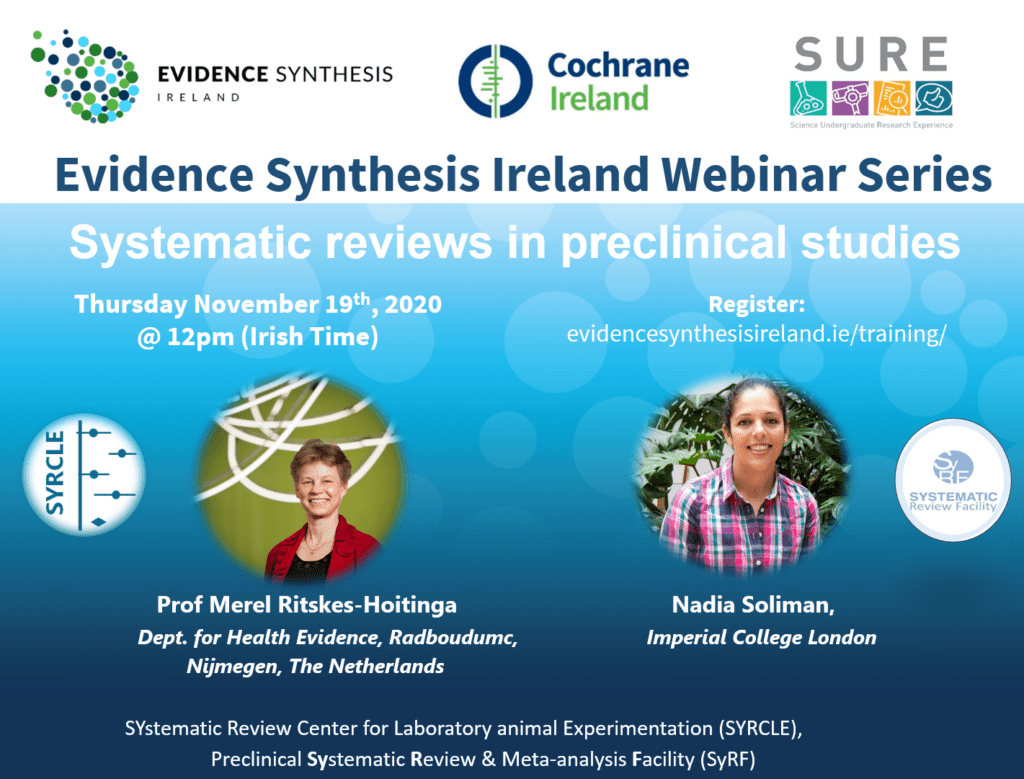Webinar: Systematic Reviews in Preclinical Studies
19nov12:00 pm1:00 pmWebinar: Systematic Reviews in Preclinical Studies12:00 pm - 1:00 pm
Event Details
The presenters for this webinar are Professor Merel Ritskes-Hoitinga, Head of SYRCLE (www.syrcle.nl), Department for Health Evidence, Radboudumc, Nijmegen, The Netherlands and Ms. Nadia Soliman, Imperial College London. Since Merel Ritskes-Hoitinga
Event Details
The presenters for this webinar are Professor Merel Ritskes-Hoitinga, Head of SYRCLE (www.syrcle.nl), Department for Health Evidence, Radboudumc, Nijmegen, The Netherlands and Ms. Nadia Soliman, Imperial College London.
Since Merel Ritskes-Hoitinga graduated as a veterinarian (1986) she has been committed to improving quality and relevance of preclinical science and animal welfare. She is now Professor in Evidence-Based Laboratory Animal Science at the Radboud University Medical Center, The Netherlands, and Honorary SKOU professor at the Department for Clinical Medicine, Aarhus University, Denmark. She founded SYRCLE (SYstematic Review Center for Laboratory Experimentation; www.syrcle.nl) in 2012, focussing on education, coaching and research in the field of preclinical systematic reviews. From 2005-2017 she was the head of the central animal facility and Professor in Laboratory Animal Science at the Radboudumc. From 1997-2005 she was professor in Laboratory Animal Science and Comparative Medicine and head of the Biomedical Laboratory at the Faculty of Health Sciences, University of Southern Denmark. She organised the first international conference on Systematic Reviews of animal studies in 2012 and organised a workshop and special meeting at the Cochrane Colloquiem in Quebec in 2013, aiming to improve the integration of the preclinical and clinical fields.
With a BSc (Hons) Pharmacology, an MSc in Drug Discovery Skills and MRes in Cellular and Molecular Biosciences, Nadia is in her final year of a PhD at Imperial College London. Her PhD is focused on developing automation technologies to improve the feasibility, efficiency and accuracy of preclinical systematic reviews while addressing neurobiological questions of interest. The reviews she is currently conducting aim to provide empirical evidence to improve the field of pain, the use of machine assisted technology and how to employ a crowd of scientists from around the world to ensure that research conduct is rigorous, interpretable, open and transparent.
Many preclinical studies aim to provide information on the safety and efficacy of new treatments. In this process, systematic reviews can support the actual implementation of the 3Rs (Replacement, Reduction, Refinement), lead to a more evidence-based choice of (animal and alternative) models and create better transparency on quality and translation of preclinical studies. This webinar will explain the methodology and give examples. It is puzzling why it has taken so long before systematic reviews as a methodology have been adopted for preclinical studies. In the clinic, systematic reviews became the routine since 1992, when the Cochrane collaboration was founded. The first preclinical systematic review was published in 2001. The number of preclinical systematic reviews has been on the rise since. Systematic reviews offer great promise for the detection and validation of alternatives to animal studies. In the Netherlands, a recent impact study among researchers having performed preclinical systematic reviews demonstrated widespread positive effects. Nadia’s PhD is focused on improving the feasibility of preclinical SRs and that has included using crowd science for collecting data from primary research for evidence synthesis. In this webinar, she signposts technologies that are being introduced to improve feasibility including machine learning before focussing on her employment of a crowd as part of the effort of the International Association for the Study of Pain Presidential Taskforce on Cannabis and Cannabinoid Analgesia. She highlights the requirement for close management and the inherent risks. She also discusses the opportunities it provides; to build and engage a diverse community, reduce bias, and allow more people to contribute to scientific research.
<iframe width=”560″ height=”315″ src=”https://www.youtube.com/embed/Utrxdgwi2U8″ frameborder=”0″ allow=”accelerometer; autoplay; clipboard-write; encrypted-media; gyroscope; picture-in-picture” allowfullscreen></iframe>

more
Additional Information
Click to here registerTime
(Thursday) 12:00 pm - 1:00 pm
